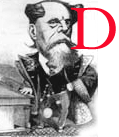 uring the Victorian era, the press became increasingly influential, and both Carlyle and Dickens
write about the dark side of that influence. In Thomas Carlyle's "Signs of the Times," he criticizes the power of
newspapers:
uring the Victorian era, the press became increasingly influential, and both Carlyle and Dickens
write about the dark side of that influence. In Thomas Carlyle's "Signs of the Times," he criticizes the power of
newspapers:
At no former era has Literature, the printed communication of Thought, been of such importance, as it is now. We often hear that the Church is in danger; and truly so it is, — in a danger it seems not to know of: for, with its tithes in the most perfect safety, its functions are becoming more and more superseded. The true Church of England, at this moment, lies in the Editors of its Newspapers. These preach to the people daily, weekly; admonishing kings themselves; advising peace or war, with an authority which only the first Reformers, and a long-past class of Popes, were possessed of; inflicting moral censure; imparting moral encouragement, consolation, edification; in all ways diligently "administering the Discipline of the Church." It may be said too, that in private disposition the new Preachers somewhat resemble the Mendicant Friars of old times: outwardly full of holy zeal; inwardly not without stratagem, and hunger for terrestrial things. [113-14]
In this passage from Pickwick, Dickens presents his own critique of the press.
Of course it was essentially and indispensably necessary that each of these powerful parties should have its chosen organ and representative: and, accordingly, there were two newspapers in the town - the Eatanswill Gazette and the Eatanswill Independent; the former advocating Blue principles, and the latter conducted on ground decidedly Buff. Fine newspapers they were. Such leading articles, and such spirited attacks! — 'Our worthless contemporary the Gazette' — 'That disgraceful and dastardly journal, the Independent' — 'That false and scurrilous print, the Independent' — 'That vile and slanderous calumniator, the Gazette;' — these, and other spirit-stirring denunciations were strewn plentifully over the columns of each, in every number, and excited feelings of the most intense delight and indignation in the bosoms of the townspeople. [166]
Both of these passages present a criticism of the press, portraying them as having too much power, and misusing their influence on people. Carlyle claims that the press abuses its power, using an unfavorable comparison to the church- his allusion to a "long-past class of Popes" suggests the extremely powerful era of Catholicism (the Holy Roman Empire) that would be frightening to the anti-papist British. Dickens' portrayal of newspapers is comically dishonest, with the papers transparently existing only as "chosen organ" for the rival political parties of the town.
Both passages use hyperbole. Carlyle criticizes newspapers by calling them the "true Church of England" and says that they "admonish kings," suggesting that they are so powerful that the traditional leaders of England are below them in the power hierarchy. Clearly, the newspapers are not so powerful, but his extreme comparison makes his criticism clear. His religious allusions continue this hyperbolic tone by portraying the press as nearly a new religion, with editors as preachers. Dickens' imaginary town of Eatanswill and its two rival papers are a hyperbolic caricature of the worst excesses of the press. His descriptions of the newspapers' critiques of each other are amusingly dramatic — "worthless," "disgraceful," and "vile" are extreme exaggerations of editorial insults.
References
Carlyle, Thomas. "Signs of the Times." Selected Writings. Ed. Alan Shelston. New York: Penguin, 1986. 61-85.
Dickens, Charles. The Pickwick Papers. 1837. Ed. Mark Wormald. New York: Penguin, 1999.
Last modified 22 March 2003